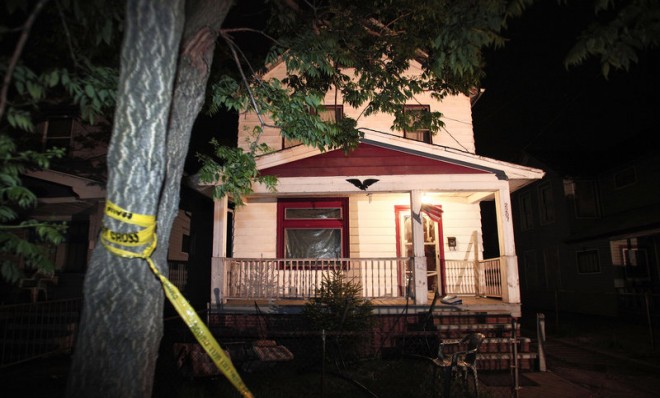7 horrifying details from the Cleveland abduction police report
The media has gotten ahold of the initial police write-up of interviews with Amanda Berry, Gina DeJesus, and Michelle Knight. It's an ugly tale


On Wednesday, Cleveland police charged Ariel Castro, 52, with four counts of kidnapping and three counts of rape for his alleged decade-long incarceration of three young women: Amanda Berry, Gina DeJesus, and Michelle Knight. Castro's brothers Pedro and Onil weren't charged, police said, because there's no evidence they knew about the kidnappings.
We have already gotten a sickening glimpse of what went on inside Ariel Castro's house, but local Cleveland TV stations and several newspapers have since gotten ahold of the initial police report, which includes early interviews with the three escaped women. "Obviously it's awful," says Laura Beck at Jezebel. Here, seven details from the Castro police report and other new revelations:
1. Castro allegedly starved and punched Knight to induce abortions
The Week
Escape your echo chamber. Get the facts behind the news, plus analysis from multiple perspectives.

Sign up for The Week's Free Newsletters
From our morning news briefing to a weekly Good News Newsletter, get the best of The Week delivered directly to your inbox.
From our morning news briefing to a weekly Good News Newsletter, get the best of The Week delivered directly to your inbox.
"Among the most disturbing information" in the police report on Castro's "never-ending bag of horror" is this disturbing tidbit, says Jezebel's Beck. Castro impregnated Michelle Knight five times during her 11 years of captivity, she told police, and according to the report, he allegedly "starved her for at least two weeks, then he repeatedly punched her in the stomach until she miscarried."
2. Knight was forced to deliver Berry's child
Police are performing a paternity test to determine whether Castro is the father of Berry's 6-year-old daughter, Jocelyn, as she is believed to be. Knight told police that she was forced to act as midwife during Jocelyn's birth, in a plastic kiddie pool. "Michelle stated that Ariel told her that if the baby died, that he'd kill her," the police report says, and the baby almost did die: She stopped breathing for a few minutes, and Knight says she put her mouth on the infant's and "breathed for her" to keep them both alive.
Castro never let any of his captives see a doctor, but he apparently took Jocelyn out of the house on numerous occasions, claiming that she was his granddaughter or the daughter of his girlfriend. He made sure the young girl never knew Knight's or DeJesus' real names, however, in case she spoke about them outside of the house.
A free daily email with the biggest news stories of the day – and the best features from TheWeek.com
3. The women were chained up in the basement when first kidnapped
Police are still trying to piece together how Castro kept the women locked up and hidden for up to 11 years, but one thing is clear, according to the police report: "All three women victims stated that Ariel chained them up in the basement, but eventually he let them free from the chains and let them live upstairs on the second floor." They then were kept in separate rooms. According to Fox 8 Cleveland, when Castro had guests over, "he would bring the women upstairs to the attic, tie them up, and tape their mouths. He would also then play music extremely loud."
4. The women only left the house twice — to go to the garage
The women told the police that they only remember leaving the house twice during their decade-long ordeal, and only to briefly visit an adjacent garage. And even then, the three abductees had to wear hats and wigs and keep their heads down.
5. Berry escaped because Castro neglected to lock the front door
Amanda Berry and her daughter were able to escape, setting in motion the rescue of DeJesus and Knight, because Castro left the house and forgot to lock the "big inside door," Berry told police. But even then, the police report says, "she thought Ariel was testing her."
Castro would "test" the women pretty frequently, especially at first, a law enforcement source tells CNN. He would pretend to leave and then return suddenly. "If there were indications any of the women had moved, they'd be disciplined." Even with that threat hanging over her head, Berry stuck her hand out the storm door and screamed for help, notes Jezebel's Beck. "The bravery and strength of these women is awe-inspiring."
6. Castro gave the women cake to celebrate 'abduction day'
As if repeated rape, forced miscarriages, and being chained up wasn't cruel enough, Castro made the women celebrate their "abduction day" every year, one of DeJesus' cousins tells The New York Times. Each year on the day he had nabbed them — each accepted his offer of a ride home — Castro would serve a special dinner and a cake, the cousin said. "He would celebrate their abduction day as their new birthday."
The women were also allowed to watch TV — at least televised coverage of their parents holding vigils for them, a law enforcement source tells CNN. It was understandably hard on the women, knowing their loved ones were still holding out hope of seeing them, even as Castro was doing his best to drain their hope of ever leaving the house.
7. Castro reportedly confessed to the crime, in an unused suicide note
Police say that Ariel Castro has waived his right to silence and has been talking to police since his arrest. But "multiple sources" tell WOIO-TV that Castro "had written a suicide note years ago outlining what he did and why." The alleged kidnapper "is sitting in the city jail, so of course, he never did take his own life," WOIO adds, but the note reportedly talks about being a sex addict, "puts some blame on the victims for getting in the car with him, and it refers to family problems and a poor childhood."
Sources: The Associated Press, Cleveland Plain Dealer (2), CNN, Fox-8, Jezebel, The Los Angeles Times, New York Daily News, The New York Times, WKYC, WOIO
Peter has worked as a news and culture writer and editor at The Week since the site's launch in 2008. He covers politics, world affairs, religion and cultural currents. His journalism career began as a copy editor at a financial newswire and has included editorial positions at The New York Times Magazine, Facts on File, and Oregon State University.
-
 Nigel Farage: was he a teenage racist?
Nigel Farage: was he a teenage racist?Talking Point Farage’s denials have been ‘slippery’, but should claims from Reform leader’s schooldays be on the news agenda?
-
 Pushing for peace: is Trump appeasing Moscow?
Pushing for peace: is Trump appeasing Moscow?In Depth European leaders succeeded in bringing themselves in from the cold and softening Moscow’s terms, but Kyiv still faces an unenviable choice
-
 Sudoku medium: November 29, 2025
Sudoku medium: November 29, 2025The daily medium sudoku puzzle from The Week
